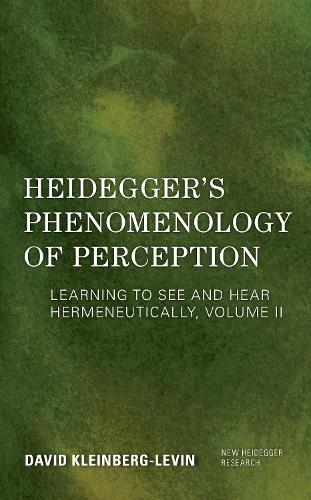
Heidegger's Phenomenology of Perception: Learning to See and Hear Hermeneutically
(Paperback)
Available Formats
Paperback
Published: 21st October 2019
Hardback
Published: 23rd October 2019
Paperback
Published: 6th January 2021
Hardback
Published: 10th December 2020
Publishing Details
Heidegger's Phenomenology of Perception: Learning to See and Hear Hermeneutically
By (Author) David Kleinberg-Levin
Bloomsbury Publishing PLC
Rowman & Littlefield International
6th January 2021
United Kingdom
Classifications
Professional and Scholarly
Non Fiction
121.34
Physical Properties
Paperback
380
Width 154mm, Height 221mm, Spine 28mm
562g
Description
In volume I, Kleinberg-Levin interprets five key words in Heideggers project. In this second volume, he illuminates their significance for Heideggers phenomenology of perception and his philosophy of history. At stake is the possibility of a new experience and understanding of being. Taking us beyond the metaphysical understanding of being, Heidegger proposes to introduce a new key word Seyn (beyng). Beyng is the Da-sein-appropriating event in which a clearing occurs as an open dimension for the time-space interplay of concealment and unconcealment, an interplay within which beings are experienced in regard to the various modes and inflections of presence and absence that the grammar of temporalities articulates. Concentrating on the appropriation of seeing and hearing as capacities and capabilities bearing promising potentialities that could be developed, Kleinberg-Levin examines seeing and hearing in the context of Heideggers critique of the history of metaphysics, wherein vision has served as paradigm for knowledge, truth, and reality. He shows that, in Heideggers philosophy of history, seeing and hearing are given a role in the transformation of the character of humanity, redeeming their own inherent potential. Perceptual experience has undergone accelerating processes of deformation and reification, encouraging a disposition that makes it serve technological and technocratic imperatives; but we might begin to redeem the promising potential in seeing and hearing, turning their damaged and dehumanized character, and their violence, towards the creation of a new planetary existencewhat Heidegger imagines through the topology of the fourfold: earth and sky, mortals and the gods who embody our ideals. In this project, we are put in question by a responsibility that summons us, in our seeing and hearing, to the response-abilities most befitting our historically shared sense of an achieved humanity.
Reviews
In this second volume of his Heideggers Phenomenology of Perception, David Kleinberg-Levin pursues his exploration of the ontological dimension of embodiment, in particular the modes of seeing and hearing. Developing chapters on the key words of Gestalt, Gestell,Gelassenheit and Geviert, Kleinberg-Levin offers a brilliant and original work on how Heideggers thought contributes to a phenomenology of perception and hermeneutics.
-- Franois Raffoul, professor of philosophy and French studies, Louisiana State UniversityAuthor Bio
David Kleinberg-Levin is professor emeritus of philosophy at Northwestern University. Books: The Bodys Recollection of Being (1985), The Opening of Vision (1988), The Listening Self (1989), The Philosophers Gaze (1999), Gestures of Ethical Life: Reading Hlderlins Question of Measure After Heidegger (2005), Before the Voice of Reason: Echoes of Responsibility in Merleau-Pontys Ecology and Levinass Ethics (2008), Redeeming Words and the Promise of Happiness: A Critical Theory Approach to Wallace Stevens and Vladimir Nabokov (2012), Redeeming Words: Language and the Promise of Happiness in the Stories of Dblin and Sebald (2013), Becketts Words: The Promise of Happiness in a Time of Mourning (2015), Heideggers Phenomenology of Perception: Introduction, vol. 1 (London: Rowman & Littlefield International, 2019), Heideggers Phenomenology of Perception: Learning to See, Learning to Hear, volume 2 (Rowman & Littlefield International, 2020).
